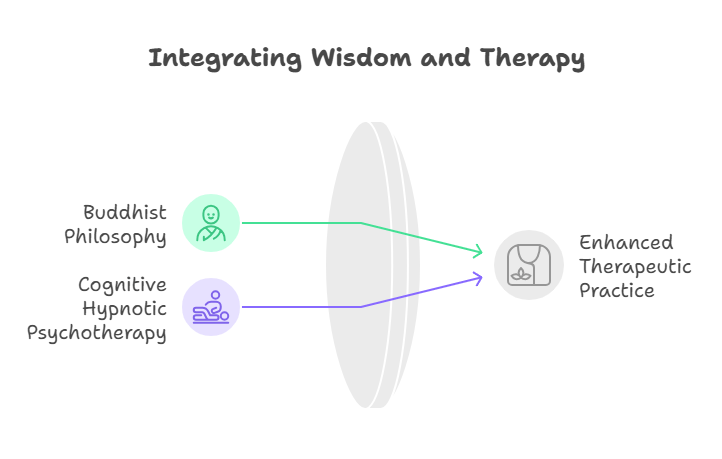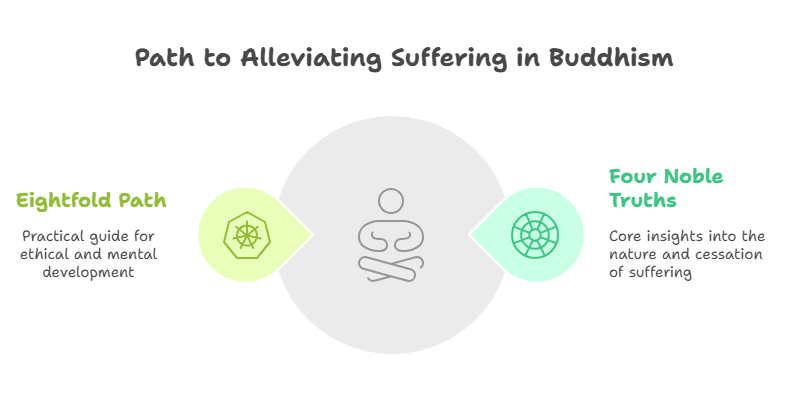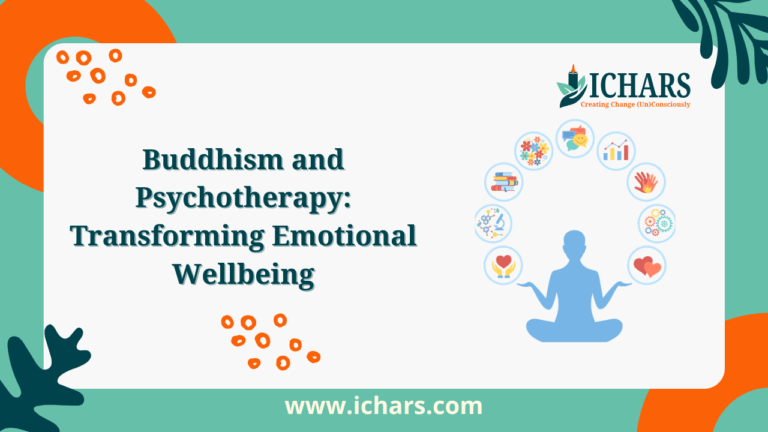Buddhism, a philosophy that has guided human understanding for over two millennia, offers profound insights into the nature of suffering, the mind, and the path to liberation.
Cognitive Hypnotic Psychotherapy (CHP), a cutting-edge therapeutic approach, embodies a similar quest: to address the complexities of human emotional experiences and empower individuals toward holistic transformation.
This article embarks on a deep dive into the integration of Buddhism with CHP, offering an advanced framework for understanding and applying these principles in clinical practice.

The Essence of Buddhism: A Philosophical Foundation
Buddhism is rooted in the quest to alleviate suffering. Its teachings, encapsulated in the Four Noble Truths and the Eightfold Path, form a philosophical and practical guide to understanding human experience:

- The Four Noble Truths
- Dukkha: The recognition of suffering as an inherent part of existence.
- Samudaya: Identifying attachment, craving, and ignorance as the causes of suffering.
- Nirodha: The possibility of ending suffering through detachment and wisdom.
- Magga: The Eightfold Path as a means to liberation.
- The Eightfold Path
A framework for ethical living, mental discipline, and wisdom, comprising right view, intention, speech, action, livelihood, effort, mindfulness, and concentration.
These principles delve into the root causes of emotional distress, making them a natural complement to psychotherapy’s goals.
Cognitive Hypnotic Psychotherapy: A Holistic Approach
CHP integrates elements of hypnosis, cognitive-behavioral therapy, psychodynamic approaches, humanistic practices, and mindfulness. It emphasizes:
- Subconscious Exploration: Accessing and transforming deep-seated beliefs and emotions.
- Cognitive Restructuring: Challenging and reframing maladaptive thought patterns.
- Emotional Empowerment: Cultivating resilience and self-compassion.
- Behavioral Transformation: Reinforcing healthy habits and behaviors.
By blending these elements, CHP provides a comprehensive framework for sustainable emotional healing, perfectly poised to integrate Buddhist principles.
Key Buddhist Concepts and Their Psychotherapeutic Relevance
- Impermanence (Anitya):
Buddhism teaches that all phenomena are transient. Understanding impermanence reduces attachment and fosters resilience.
Application in CHP: Through hypnotic techniques, clients can explore past experiences, reframing them in light of their temporary nature. For instance, guided visualization can help clients see painful memories as transient moments rather than defining events.
- Non-Self (Anatta):
The idea of Anatta challenges the notion of a fixed self, encouraging flexibility in identity and self-concept.
Application in CHP: Parts therapy and integrative techniques in CHP allow clients to reconcile conflicting aspects of their identity, promoting a fluid and compassionate sense of self.
- The Middle Way:
This principle advocates balance and moderation, avoiding extremes of indulgence or asceticism.
Application in CHP: Therapists can guide clients toward balanced perspectives in areas such as self-discipline, emotional regulation, and relational dynamics.
- Mindfulness and Present-Moment Awareness:
Mindfulness cultivates awareness and non-reactivity to thoughts and emotions.
Application in CHP: Mindfulness-based hypnosis and relaxation techniques help clients anchor themselves in the present, reducing anxiety and enhancing clarity.
- Compassion and Loving-Kindness (Metta):
Practicing Metta fosters empathy, forgiveness, and unconditional positive regard.
Application in CHP: Loving-kindness meditations can be incorporated into sessions to heal relational wounds and build self-compassion.
Advanced CHP Techniques Inspired by Buddhism
- Emotional Cleansing Through Impermanence: Using hypnotic regression, clients revisit and reinterpret past traumas, understanding them as impermanent and non-defining.
- Transforming Identity with Non-Self: Guided visualization techniques enable clients to detach from rigid self-concepts, exploring new, empowering identities.
- Cultivating Resilience Through the Middle Way: Therapists can design interventions that balance emotional expression and regulation, fostering sustainable wellbeing.
- Anchoring Present-Moment Awareness: Progressive relaxation and mindfulness anchoring techniques reduce emotional reactivity and enhance focus.
- Metta for Relational Healing: Compassion-focused interventions help clients release resentment and foster harmonious relationships.
Case Studies: Transformative Outcomes from integrating Buddhism and Psychotherapy
Case 1: Overcoming Chronic Guilt with Impermanence
A client struggling with guilt over a failed relationship engaged in hypnotic regression. By reframing the event as a transient moment rather than a reflection of their worth, they experienced profound emotional release and self-acceptance.
Case 2: Embracing Fluid Identity
A high-achieving professional burdened by the “I must always succeed” narrative used guided visualization to explore alternate self-concepts. This shift reduced self-imposed pressure and fostered a more authentic sense of self.
Case 3: Healing Relationships with Loving-Kindness
Through Metta-based hypnosis, a client with unresolved anger toward a parent developed empathy and forgiveness, transforming their relationship dynamics.
Challenges and Ethical Considerations
- Cultural Sensitivity: Therapists must respect clients’ cultural and spiritual backgrounds, ensuring Buddhist principles are introduced in a contextually appropriate manner.
- Client Readiness: Abstract concepts like non-self may initially provoke resistance. Gradual, client-centered exploration is essential.
- Balancing Depth with Accessibility: Therapists should simplify complex Buddhist teachings to ensure practical applicability without diluting their essence.
Expanding the Horizon: The Future of Buddhism and Psychotherapy
The integration of Buddhist principles into CHP not only enriches therapeutic practice but also paves the way for a more holistic understanding of mental health. As therapists explore this synergy, they:

- Enhance their capacity to address deep-seated emotional challenges.
- Empower clients to navigate life’s uncertainties with resilience and grace.
- Contribute to a broader cultural shift toward mindfulness, compassion, and balance.
Conclusion: A Transformative Alliance
The confluence of Buddhism and Psychotherapy (Cognitive Hypnotic Psychotherapy) offers a profound pathway to emotional liberation and self-discovery. By weaving timeless wisdom with modern therapeutic techniques, therapists can empower clients to:
- Embrace impermanence and fluid identity.
- Cultivate mindfulness and present-moment awareness.
- Foster compassion and relational harmony.
As this alliance deepens, it holds the potential to redefine the landscape of psychotherapy, fostering not only individual healing but also collective transformation.
The integration of these powerful frameworks invites both therapists and clients to embark on a journey of profound emotional and spiritual growth.

